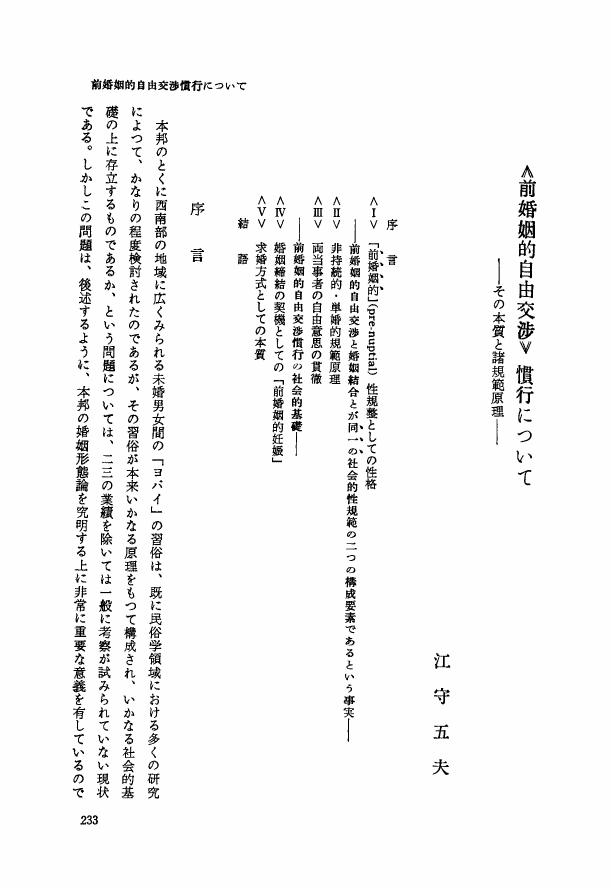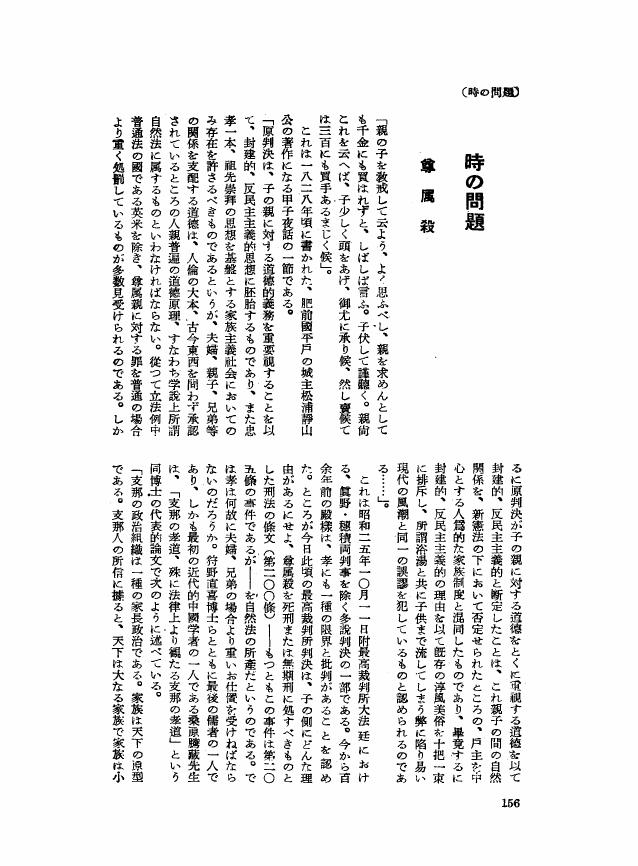- 著者
- 小室 直樹
- 出版者
- 日本法社会学会
- 雑誌
- 法社会学 (ISSN:04376161)
- 巻号頁・発行日
- vol.1975, no.28, pp.102-109, 1975
1 0 0 0 OA リゾート法とリゾート開発について 住民運動の展開をめぐって
- 著者
- 後藤 安子
- 出版者
- 日本法社会学会
- 雑誌
- 法社会学 (ISSN:04376161)
- 巻号頁・発行日
- vol.1992, no.44, pp.218-222, 1992-04-30 (Released:2009-01-15)
- 参考文献数
- 6
1 0 0 0 OA 《前婚姻的自由交渉》慣行について その本質と諸規範原理
- 著者
- 江守 五夫
- 出版者
- 日本法社会学会
- 雑誌
- 法社会学 (ISSN:04376161)
- 巻号頁・発行日
- vol.1957, no.9, pp.233-300, 1957-04-30 (Released:2009-04-03)
- 参考文献数
- 111
1 0 0 0 OA フランス法での所有権論と過少利用問題
- 著者
- 小柳 春一郎
- 出版者
- 日本法社会学会
- 雑誌
- 法社会学 (ISSN:04376161)
- 巻号頁・発行日
- vol.2015, no.81, pp.105-116, 2015 (Released:2021-05-05)
In France, the fight against vacant houses (lutte contre le logement vacant) is a more and more important political issue, even though the vacant house rate is decreasing, from 7.0 percent in 2000 to 6.0 percent in 2010. The rate of house for secondary or seasonal use is slightly declining from 10.0 percent in 2000 to 9.8 percent in 2010. This is because the total population in France was rapidly increasing 6.7 percent during the 10 years. It recorded at 64.6 million people in 2010 from 60.5 million in 2010. The pressure of the growing population and the shortage of decent houses especially in large cities are the main reasons for the measures against vacant houses. The tax against vacant houses and the requisition of vacant houses are the two main axes of the legislative measures for the fight against vacant houses. The former is introduced by the Act against exclusion in 1998 and is related to the owners of the houses vacant for at least two years in the eight areas with more than 200,000 inhabitants. The 2013 reform expanded the implementation areas (from 8 to 28 areas) and raised the tax rate. The latter has a long history and was often implemented at the post-Second-World-War period. However, there has been a very rare case of application these days, due to the difficulties in detecting the vacancy. The underuse of house is theoretically permissible in the context of French Law. However, the concept of housing right plays an important role in restricting the owners’ property right.
1 0 0 0 OA 法による祭の保存 祇園祭山鉾保存会財団法人化におけるコミュニティの法使用
- 著者
- 古山 真知子
- 出版者
- 日本法社会学会
- 雑誌
- 法社会学 (ISSN:04376161)
- 巻号頁・発行日
- vol.2016, no.82, pp.185-217, 2016 (Released:2021-05-05)
This paper focuses on the legal mobilization by the community in making a foundation of Gion Festival Yamahoko Association. Law has two faces, law as milieu and law as resource, for communities. When changes of milieu including changes of law have a severe effect to the traditional festival, people deal with it by the legal mobilization that is making a foundation of Yamahoko Association. I re searched Yamahoko associations for about three years and in this paper pick up four associations that had called up law. The mobilization of law is tied to obtaining three big essential resources “human,” “material” and “pecuniary,” in conservation of the traditional festival. Gion Festival has more than 1000-year-old history in Kyoto and a very traditional style. In such a traditional festival, the making of the foundation has beneficial effects on “pecuniary,” “material” and “human” resources, moving the estate “cho-ie” (community’s common house) and the festival goods “yamahoko” to the fundamental property of the foundation. Each association makes it possible to preserve Japanese traditional festival by using the modern law. Here we can observe the different connection between the society and the law from the aspect that the mobilizing law typically implies modernization, democratization and westernization to the society.
1 0 0 0 OA 尊属殺
- 出版者
- 日本法社会学会
- 雑誌
- 法社会学 (ISSN:04376161)
- 巻号頁・発行日
- vol.1951, no.1, pp.156-160, 1951 (Released:2009-04-03)
1 0 0 0 OA 私法と公法の<協働>の様相
- 著者
- 山本 隆司
- 出版者
- 日本法社会学会
- 雑誌
- 法社会学 (ISSN:04376161)
- 巻号頁・発行日
- vol.2007, no.66, pp.16-36, 2007 (Released:2017-01-31)
1 0 0 0 OA 人と法を結ぶもの 弁護士の不在と非専門リソース
- 著者
- 大澤 恒夫
- 出版者
- 日本法社会学会
- 雑誌
- 法社会学 (ISSN:04376161)
- 巻号頁・発行日
- vol.2009, no.70, pp.206-219, 2009 (Released:2017-01-31)
1 0 0 0 少額事件•本人訴訟と裁判手続
- 著者
- 和田 仁孝
- 出版者
- 日本法社会学会
- 雑誌
- 法社会学 (ISSN:04376161)
- 巻号頁・発行日
- vol.1991, no.43, pp.22-30,232, 1991
This paper examines the conditions on which small Claim litigation process canbe more favorably accepted by lay litigants. The point is that, beyond the role of legal decision-malcer, judges should give emotional support lay litrgauts to help them establish theiv own strnctnred idea of their problems. In order to make this judge's newrole workable, followiny alternative perceptions on litigation, lawyers and small claim cases must be emphasized:<br>1) litigation as a process of transformation of each litigants idea of his problem, <br>2) judge as dispnte processor or negotiator (not as "legal" profession), <br>3) small claim case as a complex which consists of emotioual, societal and legal problems.
1 0 0 0 人と法を結ぶもの:弁護士の不在と非専門リソース
- 著者
- 大澤 恒夫
- 出版者
- 日本法社会学会
- 雑誌
- 法社会学 (ISSN:04376161)
- 巻号頁・発行日
- vol.2009, no.70, pp.206-219, 2009
1 0 0 0 アフガニスタン革命と土地改革法
- 著者
- 小林 三衛
- 出版者
- 日本法社会学会
- 雑誌
- 法社会学 (ISSN:04376161)
- 巻号頁・発行日
- vol.1982, no.34, pp.117-121,282, 1982
Afghanistan Revolution broke out April 1978. Its political power exchanged from Taraki to Amin, from Amin to Karumal in a short term. The Soviet Union intervenced to Afghanistan by military affairs December 1979. Afghanistan Revolution has lacked general public basis in its progress.<br>"Basis Lines of Revolutionary Duties of Goverment of Democratic Republic of Afghanistan" by Taraki, chairman of the Revolutionary Council at first mentions land reform about the fundermental social and economic change. The proclamation No. 8th Revolutionary Council December 2, 1978, gives land reform. I name it "Land Reform Act". It has people's democratic character, but its enforcement isn't always smooth. I think this fact is caused that Afghanistan Revolution has lacked general public basis.
1 0 0 0 ヘックと類型法学:いわゆる『隠れた欠缺』をてがかりとして
- 著者
- 青井 秀夫
- 出版者
- 日本法社会学会
- 雑誌
- 法社会学 (ISSN:04376161)
- 巻号頁・発行日
- vol.1994, no.46, pp.176-181, 1994
1 0 0 0 OA 犯罪被害者と法 何が伝えられるべきか
- 著者
- 白井 孝一
- 出版者
- 日本法社会学会
- 雑誌
- 法社会学 (ISSN:04376161)
- 巻号頁・発行日
- vol.2008, no.68, pp.176-188, 2008 (Released:2017-01-31)
- 著者
- 長谷川 貴陽史
- 出版者
- 日本法社会学会
- 雑誌
- 法社会学 (ISSN:04376161)
- 巻号頁・発行日
- vol.2011, no.74, pp.64-77, 2011
1 0 0 0 憲法判例の研究
- 著者
- 長谷川 正安
- 出版者
- 日本法社会学会
- 雑誌
- 法社会学 (ISSN:04376161)
- 巻号頁・発行日
- vol.1964, no.16, pp.19-30,142, 1964
The writer points out three difficulties particular in studying of constitutional cases; first, in fact finding, because it should not be confined to relevant alleged wrongful conducts but be extended to its social and historical background within the constitutional process; next, in the necessity for analysis into judge's ideological prejudice, which represents their own views of social and political life in our community and which plays key role in counter-balancing the intervention into human rights on prevailing political power; finally, in establishing solid principle of stare decisis declared by the Supreme Court due to the relatively small number of its precedents with their conceptual ambiguity.<br>As to the purpose of studying constitutional cases, scholars are required to make minute analysis into the judicial decision-making relating to the constitution in the whole context of constitutional process. The theory based upon such an analysis is expected to be useful for the scholars who are forced to take a definite attitude either for or against the decision, as their practical means to influence the future decisions in realizing their constitutional goals and ideas.
1 0 0 0 OA 家長選挙制論
- 著者
- 磯野 誠一
- 出版者
- 日本法社会学会
- 雑誌
- 法社会学 (ISSN:04376161)
- 巻号頁・発行日
- vol.1956, no.7-8, pp.235-264, 1956-07-20 (Released:2009-04-03)
- 参考文献数
- 55
1 0 0 0 組織内紛争処理:総合職女性をめぐる法と社会
- 著者
- 佐藤 俊樹
- 出版者
- 日本法社会学会
- 雑誌
- 法社会学 (ISSN:04376161)
- 巻号頁・発行日
- vol.1997, no.49, pp.63-73,253, 1997
Since 1984, Japanese organizations obtain a new worker-category "Sougoushoku Josei" (White-caller women in integrated course), which is made by the law "Koyoukikai-kinntouhou". Many disputes observed arround them, and most of them are not resoluted until now.<br>The Japanese organization and their dispute resolution depend much on implicit role -expectation under long-term social relation. "Sougoushoku Josei" is made by law, and no social role corresponds to it. So there is no creiterion or base of organizaional dispute resolution, and because of it, mutual misunderstandings are duplicated and complicated. This situation not only makes many disputes unresoluted, but also produces new dispute on dispute resolution itself.<br>In this paper, using some examples from a Japanese enterprise, we show the social mechanism of this multiple dispute-situation and take consider on some ways of resoluting it.
1 0 0 0 クレイム申し立てと法形成:構築主義社会問題論の可能性
- 著者
- 中河 伸俊
- 出版者
- 日本法社会学会
- 雑誌
- 法社会学 (ISSN:04376161)
- 巻号頁・発行日
- vol.1994, no.46, pp.234-238, 1994
1 0 0 0 公共性の法社会学――序論的考察
- 著者
- 長谷川 貴陽史
- 出版者
- 日本法社会学会
- 雑誌
- 法社会学 (ISSN:04376161)
- 巻号頁・発行日
- vol.2008, no.68, pp.12-24, 2008
1 0 0 0 OA 越智啓三著『家族協定の法社会学的研究』
- 著者
- 丸山 茂
- 出版者
- 日本法社会学会
- 雑誌
- 法社会学 (ISSN:04376161)
- 巻号頁・発行日
- vol.2008, no.69, pp.223-229, 2008 (Released:2017-01-31)







